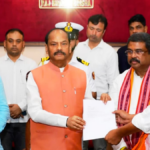By Ashis Biswas
Sikh separatist Amritpal Singh is the winner from Punjab’s Khadoor Sahib parliamentary constituency, putting the central government in a fix. The government appears undecided on what should be done with him. Speculation is rife over whether he would be released on interim bail from Dibrugarh Central jail in Assam, where he is being held, or other measures are under consideration.
Whatever the explanation, the government’s silence is telling. Neither the Union Home Ministry nor the Central Election Commission had reckoned with the possibility of a pro-Khalistani winning the election. Even a bland official reaction, considering that a new government is being installed, would have helped quell political gossip.
The fact is, Amritpal Singh’s victory caught the Government of India off guard. Top Bharatiya Janata Party policymakers were busy installing the “NDA coalition” in New Delhi. The transition wasn’t difficult but attention couldn’t be divided. The new NDA government had to hit the deck running and the BJP-dominated administration had no time to spare for the Khalistani enabler.
Besides, the new government is up against strong headwinds. The terrorist-killings of Hindu pilgrims in the Reasi district of Kashmir, where elections had just been held, on the day Narendra Modi was being sworn-in as Prime Minister, was a stark warning that the situation on the Line of Control was far from stable. The hand of Pakistan in the terrorist strike cannot be ruled out.
The timing of the terror strike was chosen meticulously. The Pakistan-based terrorist organisation’s wanted to test the ‘new’ Narendra Modi government. It was a blatantly provocative action against India. When Pulwama occurred, Modi had spoken out strongly and had ordered a devastating counterattack on Balakot across the LoC. Modi’s party BJP held 303 out of 543 seats in the Lok Sabha at the time.
Today, the situation is different. The BJP has lost 63 seats and has a tally of only 240 seats after the 2024 Lok Sabha election. Is Modi 3.0 in a position to deal with provocations from across the border? The Reasi terror attack is a unique challenge. No wonder it took the newly installed Modi government all the time to react.
For the record, it is not Pakistan alone, China, the US and EU countries would also like to know more about how the new NDA government fares against specific troubles. The Congress has condemned the Reasi incident. But questions are also being asked whether the abrogation of Article 370, ending the special status of Jammu and Kashmir, had really worked? Most observers familiar with Modi’s style of functioning are convinced that the GoI would respond effectively, choosing its own time and place.
Pakistan’s (or the ISI’s) involvement in the Reasi ambush has to be established. But its support for the Khalistani anti-India agitation cannot be denied. So, what should be done with Amritpal Singh? The surge in anti-Indian activities of Sikh separatists in Canada or the UK – targeting Indian missions, cultural centres and temples – are part of a regional political agenda that was drawn up much earlier.
Observers point to the liberalization of some years ago by Pakistan, during the Imran Khan regime, to facilitate the movement of and visits by international Sikh pilgrims to the revered Kartarpur Sahib site as a critical turning point in the Khalistan agitation. A few Kolkata-based analysts had predicted that the GoI should brace itself for a renewal of the Khalistani anti-India diplomatic offensive.
The place is too close to the Indian border for India’s comfort. The easing of rules for Sikhs had led to a rise in the number of visiting Indian Sikhs, including pro-Khalistani elements.
The challenges that GoI/Indian diplomats faced later in Canada and elsewhere have confirmed the apprehensions expressed earlier. Indeed the barely concealed Western support for the Khalistanis in the UK, Canada or among a section of US diplomats has been nothing short of a revelation, part of a painful learning experience, for India.
For all its lip support to India as the world’s largest democracy, the West has never ceased to express its distrust of Indian political institutions, its non-aligned foreign policy, its general elections, its HR record and handling of minorities. Given this backdrop, it was no surprise to see most western countries expressing support for the farmers’ agitation.
There can be no mistaking the generally satisfied tone among large sections of the western media accounts over the outcome of the 2024 Lok Sabha polls and the marked decline in the BJP’s strength. Clearly, India may have become a regionally important player in Asia, but it will not do for Indian leaders or their political parties to be ‘uppity’ vis-à-vis the advanced West!
The NDA must tread carefully in the present situation, facing a hostile China and a distrustful bunch of Western countries, it must put its own house in order. It has its work cut out. The challenge posed by the Khalistanis would require careful handling. It cannot be denied that Amritpal Singh’s winning margin over his INC rival of nearly 200,000 votes is among the highest in Punjab. Also, Singh is not the only separatist to win a Parliamentary election. Engineer Rashid, another separatist, contested as an independent and won. What unites Amritpal Singh and Engineer Rashid is that both have no faith in the Constitution of India. (IPA Service)



 Tribal leader Mohan Majhi is Odisha’s new CM
Tribal leader Mohan Majhi is Odisha’s new CM 